

As the line between platform and publisher continues to blur, who wins and who loses? As publishing tools have become cheaper and more distributed, many have benefited from this ongoing democratization of distribution — whether it’s Twitter users posting newsworthy updates from war zones, or would-be authors publishing their thoughts on Medium.
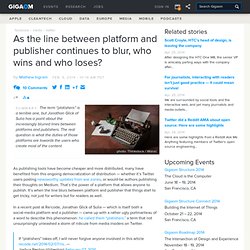
That’s the power of a platform that allows anyone to publish. It’s when the line blurs between platform and publisher that things start to get tricky, not just for writers but for readers as well. In a recent post at Re/code, Jonathan Glick of Sulia — which is itself both a social-media platform and a publisher — came up with a rather ugly portmanteau of a word to describe this phenomenon: he called them “platishers,” a term that not unsurprisingly unleashed a storm of ridicule from media insiders on Twitter. Opening Production and Commons: 90-percent PhD seminar. Welcome to the 90-percent seminar of interaction design PhD student Anna Seravalli whose work deals with the opening of (tangible) production and commons.
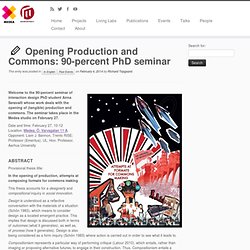
The seminar takes place in the Medea studio on February 27. Date and time: February 27, 10-12 Location: Medea, Ö. Varvsgatan 11 A. Opponent: Liam J. La creatividad redistribuida - Nestor Garcia Canclini, Juan Villoro. Your social TV. Apple ordered to change ‘most favored’ e-book contracts. A federal judge on Friday ordered Apple to alter its contracts with e-books publishers to ensure price competition, in a closely watched decision that could ripple across Internet commerce for videos, music and other media.
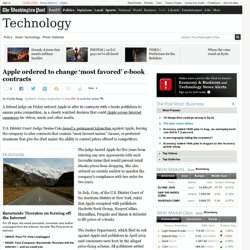
U.S. District Court Judge Denise Cote issued a permanent injunction against Apple, forcing the company to alter contracts that contain “most favored nation” clauses, or preferred treatment that give the iPad maker the ability to control prices offered to competitors. The judge barred Apple for five years from entering any new agreements with such favorable terms that would prevent retail ebooks prices from dropping. She also ordered an outside auditor to monitor the company’s compliance with her order for two years.
In July, Cote, of the U.S. The Justice Department, which filed its suit against Apple and publishers in April 2012, said consumers were hurt by the alleged price-fixing scheme. Apple vowed to appeal the injunction. Apple has much to lose. Information Engineering and Computer Science First time we work with color.
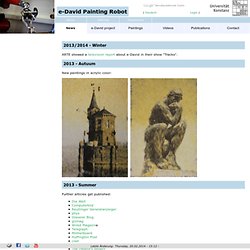
We used three different kind of Brushpens (a special form of Pen with a brush) with colors Yellow, Magenta, Cyan. The image is renered by using differenet brush strokes widths in a set of parallel lines. First time we work with brushes. The width of a stroke is controlled by the distance of the tool from the canvas. El boom de la autoedición reinventa modelos editoriales. En Estados Unidos, el número de libros autoeditados -tanto en papel como en digital- está creciendo vertiginosamente, un 287% desde el 2006, y ya suponen 235.000 títulos, un 43 % del total.
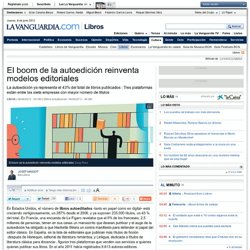
En Francia, una encuesta de Le Figaro revelaba que el 6% de los franceses, 2,5 millones de personas, tienen en sus casas un manuscrito que desean publicar y el auge de la autoedición ha obligado a que Hachette filtrara un contra manifiesto para defender el papel del editor clásico. Generative Music Test with Pure Data. Where Has the "Author" Gone in Copyright? Why is the notion of the copyright "author" held in such low regard?
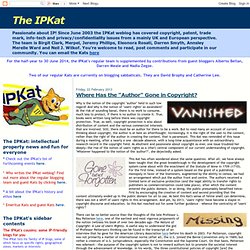
And why is the notion of "users' rights" so ascendant? At the risk of sounding banal, there is no work to consume, much less to protect, if there is no author to create it. True, books were written long before there was copyright protection. True, as well, copyright protection is also about distribution of content and the various commercial interests that are involved. Still, there must be an author for there to be a work. This Kat has often wondered about the same question. There can be no better source than the thoughts of the late Professor L.
Montserrat Domínguez: “La agregación de contenidos es el alma de Internet” Montserrat Domínguez, directora de El Huffington Post de España participó en el webinar “Donde el algoritmo no llega: los nuevos dilemas éticos de la información online” organizado por la Red Ética Segura de la Fundación para el Nuevo Periodismo Iberoamericano (FNPI).

Desde hace nueve meses dirige El Huffington Post, la versión en español del gigante The Huffington Post. Se presenta como una periodista tradicional que ha trabajado en los llamados “viejos medios”. Con gran humildad, dijo a la audiencia que no se considera una gurú o una teórica. Así que en el webinar nos mostró lo que venía descubriendo en un medio como El Huffington Post. “Voy a contarles lo que me llama más la atención de un medio como el HP, que dirijo desde que saliera su edición en España.
Minecraft.
Programmer creates 800,000 books algorithmically, starts selling them on Amazon. When we think about writing books, especially the technical kind, we think about a person or small group of people hunched over their keyboards typing away. There’s a good reason for that mental image: that’s how the majority of books are written. That’s not the way it has to be, though. Philip M. Parker, a marketing professor at INSEAD, has a patented system for algorithmically compiling data into book form. Thanks to Parker’s system, Amazon now has over 800,000 books for sale from his company. In a fascinating piece covering the news the sheer power of this system was revealed. This video below features Parker himself explaining how the process works, and why it’s useful. The technology isn’t just for books. Now read: Spaun, the most realistic artificial human brain yet.